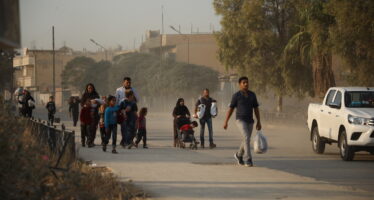Kürkçü: Gezi was an Uprising for the 21st Century
![]()
The BDP MP from Mersin, Ertu?rul Kürkçü, took part in a panel over the weekend as of part of the ongoing “Conversations on Rebellion” program at the Kumbara Art Workshop in the Pera district of Istanbul – according to an article in today’s Özgür Gündem. During the panel, which was entitled “From 1968 to the Gezi Resistance,” Kürkçü shared his thoughts and observations about the Gezi uprisings that began late last May in Istanbul and quickly spread throughout the country. Among a number of points, Kürkçü noted that the uprising was “a sudden, huge explosion” that not even the state or police were expecting and that kicked of a new era of social struggle and resistance throughout Turkey. He compared the spontaneous and unexpected nature of the uprising to the October Revolution, saying ‘No one in Russia believed that there would be a revolution on November 6th. But together with the take over of the Winter Palace on the night of November 6th-7th the fate of Russia changed.”
Kürkçü went on to stress, however, that the struggle that began in Gezi Park was not a coincidence, but a resistance over ecological concerns and for the right to the city that manifested itself in concrete form in opposition to the conditions surrounding Turkish capitalism’s attempts to reproduce itself over the past ten years. He underlined the fact that Gezi was an uprising suited to the 21st Century and was different from all the uprisings that had come before it, remarking “the workers movements of the 15-16th of June [1970] remained within the borders of Istanbul and Izmit. Whereas the Gezi resistance was a resistance that spread to every region of Turkey. In this sense Gezi does not resemble them. The unemployed rebelled because they had no future. What we saw was a labor struggle. In Gezi there were people from every exploited and oppressed part of society. I do not see a middle class movement here.”
Kürkçü also noted the importance of the football fan groups in the uprising, saying “I do not not think we would have had the barricades and street fighting if it had not been for the groups of supporters. Because the supporters had more preparation that the students. I would never have imagined that the football supporters would have fought for revolution.”
“The same thing was done to the Kurds for twenty years”
Finally Kürkçü evaluated the political content of the slogans and positions taking by the protests, arguing that he found the slogans very meaningful and the “standing man” demonstration to be a very significant action, remarking “an actually was displayed that carried the resistence of the forums. The AKP was constantly shooting itself in the foot during Gezi. Because this was a real revolt and the AKP did not understand this. Now you all understood why the Kurdish peolple never trusted the government. The best consequence that came out of Gezi is understood yb the sentence “they have been doing the same thing to the Kurds for twenty years.”
* Translation by The Rojava Report
Related Articles
BARRICATE NO TAV
![]()
Cronaca di una notte sulle barricate per i valsusini No Tav. All’assemblea del Presidio della Maddalena, alla Clarea di Chiomonte,
La guerra interrumpe el festival de cine
![]()
Sin nunca bajar la guardia la gente de Serekaniye y toda la Federación del Norte y Este de Siria ha
Stormont collapse likely after DUP ultimatum is rejected
![]()
A Stormont committee has refused on Thursday to adjourn the Six County Assembly despite a DUP threat that it would otherwise pull down the North’s political institutions




